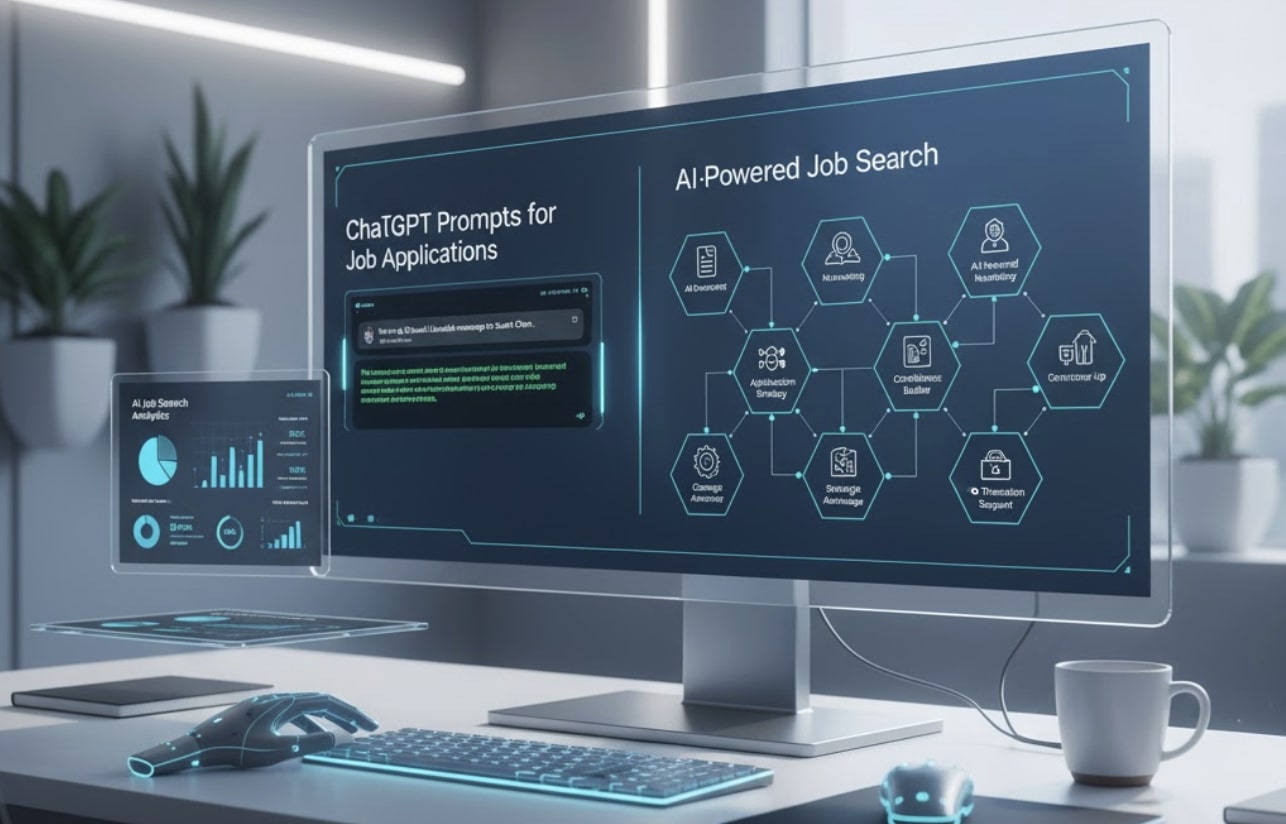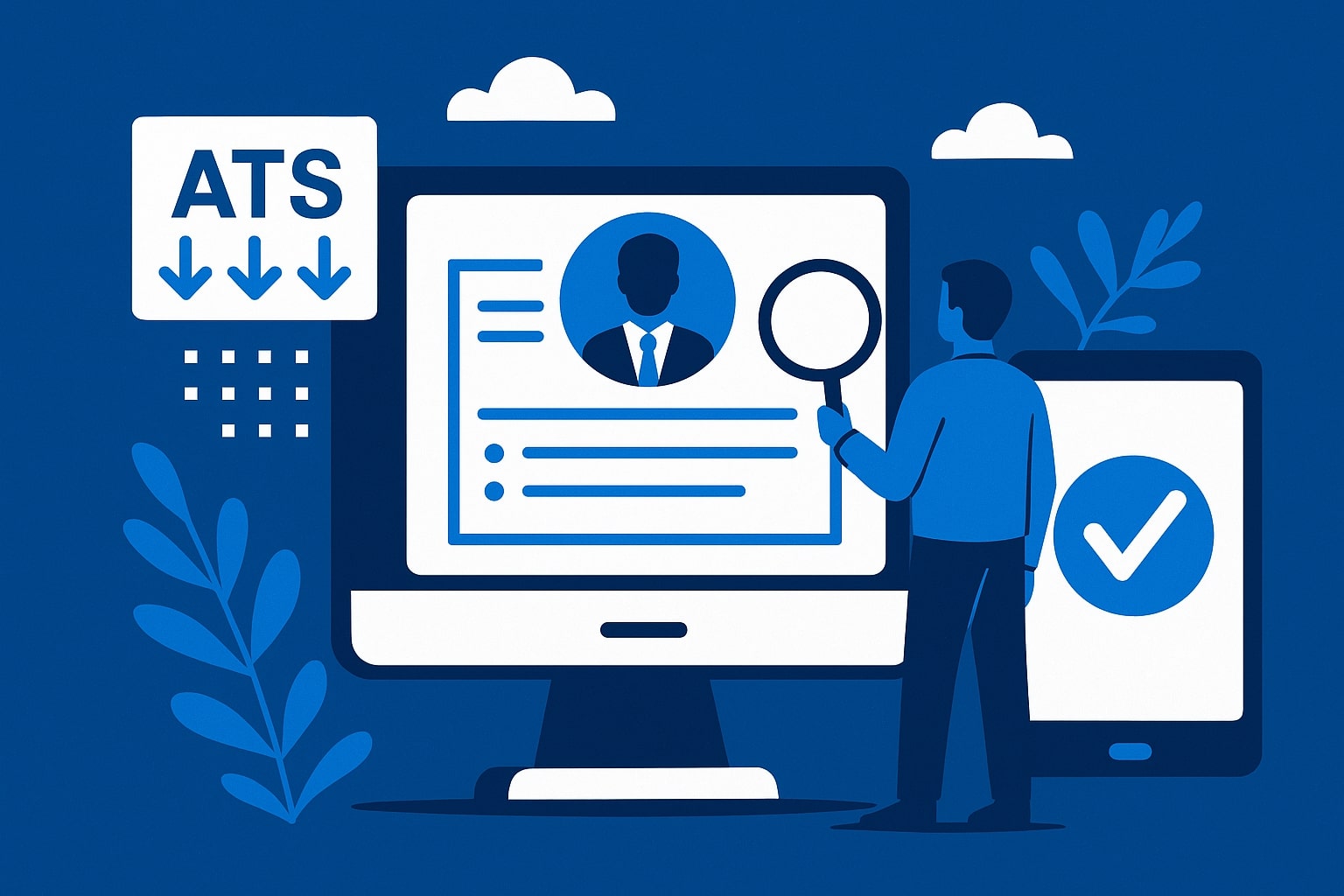Landing your dream job has never been more competitive, yet artificial intelligence is revolutionizing how candidates prepare for interviews. With AI-powered tools now available to simulate real interview scenarios, practice responses, and receive instant feedback, job seekers can significantly improve their chances of success.
Traditional interview preparation methods often leave candidates feeling unprepared for unexpected questions or struggling with confidence issues. Modern interview preparation with AI addresses these challenges by providing personalized coaching, unlimited practice opportunities, and data-driven insights into your performance.
This comprehensive guide will transform your interview preparation approach using cutting-edge AI technology. You’ll discover proven strategies, practical tools, and expert techniques that have helped thousands of professionals secure their ideal positions across various industries.
1. Understanding AI-Powered Interview Preparation
AI interview preparation represents a fundamental shift from traditional practice methods. Instead of relying solely on friends, family, or career counselors for feedback, intelligent algorithms can analyze your responses, body language, and communication patterns to provide objective, actionable insights.
The technology works by leveraging natural language processing, machine learning, and speech recognition to evaluate multiple aspects of your interview performance simultaneously. These systems can detect patterns in successful candidates’ responses and help you align your answers accordingly.
Modern AI preparation tools offer several distinct advantages over conventional methods. They provide 24/7 availability, eliminate scheduling conflicts with practice partners, and offer consistent feedback quality regardless of when you practice.
- Personalized Learning Path. AI systems adapt to your specific industry, role level, and skill gaps to create customized preparation experiences that target your unique needs.
- Real-Time Performance Analysis. Instant feedback on speech patterns, filler words, pace, and content quality helps you make immediate improvements during practice sessions.
- Comprehensive Question Database. Access to thousands of industry-specific questions, behavioral scenarios, and technical challenges that mirror real interview conditions.
- Progress Tracking and Analytics. Detailed reports showing improvement over time, weak areas requiring attention, and readiness scores for different interview types.
Research indicates that candidates who use AI-powered interview preparation tools show significant improvement in confidence levels and response quality compared to traditional methods.
The Science Behind AI Interview Analysis
AI interview systems utilize sophisticated algorithms to evaluate multiple dimensions of your performance. Voice analysis technology assesses your tone, pace, and vocal confidence, while semantic analysis evaluates the content and structure of your responses.
These systems can identify subtle patterns that human evaluators might miss. For example, they can detect micro-hesitations that suggest uncertainty, analyze the logical flow of your arguments, and measure the alignment between your responses and successful candidate profiles.
The feedback mechanisms incorporate machine learning models trained on thousands of successful interview outcomes. This data-driven approach ensures that recommendations are based on proven success patterns rather than subjective opinions.
2. Essential AI Tools and Platforms for Interview Success
The market offers numerous AI-powered platforms designed to enhance your interview preparation experience. Leading solutions combine video practice, speech analysis, and personalized coaching to create comprehensive preparation environments.
Selecting the right platform depends on your specific needs, budget, and the types of interviews you’re preparing for. Some tools excel at behavioral question practice, while others focus on technical assessments or industry-specific scenarios.
- 89% of HR professionals report that candidates using AI preparation tools demonstrate better interview performance
- 76% of job seekers using AI tools feel more confident during actual interviews
- 68% of candidates report receiving job offers after implementing AI-guided preparation strategies
- 54% of users notice significant improvement in response quality within the first week
- 47% of professionals credit AI tools with helping them secure promotions
- 41% of career changers successfully transition industries using AI-powered preparation
Video-Based AI Interview Platforms
Video-enabled AI platforms provide the most comprehensive preparation experience by analyzing both verbal and non-verbal communication. These tools use computer vision technology to evaluate eye contact, facial expressions, and body language alongside your spoken responses.
The visual analysis component helps identify unconscious habits that might negatively impact your interview performance. Common issues include fidgeting behaviors, inconsistent eye contact, or distracting gestures that detract from your message.
Many platforms offer mock interview scenarios that simulate real interview environments, complete with realistic questioning patterns and time constraints. This immersive approach helps reduce anxiety and build confidence for the actual interview experience.
Voice-Only AI Coaching Systems
Audio-focused AI tools concentrate exclusively on speech patterns, vocal delivery, and response content without visual distractions. These platforms are particularly valuable for phone interviews or when you want to focus specifically on verbal communication skills.
Voice analysis capabilities include detection of filler words, assessment of speaking pace, evaluation of vocal confidence, and analysis of response completeness. The systems provide detailed metrics on areas like clarity, enthusiasm, and professional tone.
Some candidates prefer starting with voice-only tools to build confidence in their responses before progressing to video-based platforms that analyze additional communication dimensions.
| Platform Type | Key Features | Best For |
|---|---|---|
| Video + Voice Analysis | Complete communication assessment, body language feedback, eye contact tracking | In-person and video interviews |
| Voice-Only Systems | Speech pattern analysis, pace evaluation, content assessment | Phone interviews, verbal skill development |
| Text-Based AI Coaches | Response optimization, content suggestions, question prediction | Written preparation, response crafting |
| Industry-Specific Tools | Role-relevant questions, sector expertise, technical assessments | Specialized positions, career changers |
3. Creating Your AI-Powered Practice Schedule
Effective interview preparation requires consistent practice and strategic timing to maximize retention and confidence building. AI tools excel when integrated into a structured preparation schedule that balances intensive practice sessions with reflection and improvement periods.
The optimal preparation timeline varies based on your current skill level, interview complexity, and available time. However, research shows that distributed practice sessions over several weeks produce better results than cramming all preparation into a few days.
Most successful candidates allocate 45-60 minutes daily for AI-powered practice during the two weeks leading up to their interview. This duration allows for meaningful practice without causing mental fatigue or diminishing returns.
Week-by-Week Preparation Framework
Week 1 focuses on establishing baseline performance metrics and familiarizing yourself with the AI platform’s features. During this initial phase, concentrate on completing diagnostic assessments and identifying your strongest and weakest areas.
The first week should include practice sessions covering basic behavioral questions, company research integration, and fundamental response structuring. AI feedback during this period helps establish improvement benchmarks for subsequent weeks.
Week 2 intensifies practice with industry-specific questions and challenging scenarios. This phase emphasizes refining your responses based on AI feedback and developing consistency in your delivery style and content quality.
✔ Sample Daily Practice Schedule
“Start with a 10-minute warm-up covering basic questions, followed by 25 minutes of targeted practice on your weakest areas identified by AI analysis. Conclude with 10 minutes reviewing feedback and planning improvements for tomorrow’s session.”
Optimizing Practice Session Intensity
AI systems provide valuable data on your optimal practice intensity and session duration. Performance analytics can reveal patterns showing when you perform best and how long you can maintain peak focus during practice sessions.
Most platforms offer adaptive difficulty settings that automatically adjust question complexity based on your improving performance. This ensures that practice sessions remain challenging without becoming overwhelming or discouraging.
Pay attention to AI-generated fatigue indicators that suggest when to take breaks or end practice sessions. Overextended practice can lead to diminishing returns and potentially reinforce poor habits when concentration wanes.
4. Mastering Common Interview Questions with AI
AI platforms excel at helping candidates master the most frequently asked interview questions by providing unlimited practice opportunities and immediate feedback on response quality. These systems maintain extensive databases of common questions across industries and job levels.
The key advantage of AI-powered practice lies in its ability to analyze response patterns and suggest improvements in real-time. Unlike human practice partners, AI systems never get tired of repetition and consistently provide objective feedback.
Successful candidates typically focus on mastering 15-20 core questions that appear in most interview situations, then expand their preparation to include role-specific and company-specific inquiries based on their research.
Behavioral Interview Questions
Behavioral questions assess how you’ve handled specific situations in the past, and AI systems excel at helping you structure compelling responses using proven frameworks like the STAR method (Situation, Task, Action, Result).
AI analysis can evaluate whether your responses include all necessary STAR components and suggest improvements to make your examples more compelling. The systems also help ensure your stories demonstrate the specific competencies interviewers seek.
Common behavioral questions that AI tools help candidates master include challenges involving leadership experience, conflict resolution, project management, and adaptability to change. Each response should showcase specific skills while providing quantifiable results when possible.
- ✓ “Tell me about a time you faced a significant challenge” – Practice with specific examples and measurable outcomes
- ✓ “Describe a situation where you had to work with a difficult team member” – Focus on resolution strategies and positive results
- ✓ “Give me an example of when you had to meet a tight deadline” – Emphasize planning, prioritization, and time management skills
- ✓ “Tell me about a time you made a mistake” – Highlight learning, accountability, and improvement measures
- ✓ “Describe a project you led from start to finish” – Showcase leadership, organization, and achievement of objectives
- ✓ “Share an example of when you had to adapt to significant change” – Demonstrate flexibility and positive attitude toward evolution
Technical and Industry-Specific Questions
AI platforms increasingly offer specialized modules for different industries and technical roles. These systems can simulate technical interviews, coding challenges, and industry-specific scenario discussions with relevant expertise.
For technical positions, AI tools can evaluate your problem-solving approach, communication of complex concepts, and ability to think through challenges systematically. Some platforms integrate with coding environments to assess programming skills in real-time.
Industry-specific preparation includes understanding sector trends, regulatory requirements, competitive landscapes, and emerging technologies. AI systems can quiz you on relevant knowledge and help you articulate how your experience aligns with industry needs.
Prompt Example for AI Interview Practice
Here’s an effective prompt you can use with AI interview preparation tools:
✔ AI Interview Practice Prompt Example 1
“Please conduct a behavioral interview focusing on leadership scenarios for a senior marketing manager position at a B2B SaaS company. Ask me questions about team management, project leadership, and strategic decision-making. After each response, provide specific feedback on my use of the STAR method, the clarity of my examples, and suggestions for improvement. Rate my confidence level and speaking pace.”
5. Leveraging AI for Company and Role Research
Modern AI systems extend beyond interview practice to provide comprehensive company intelligence and role analysis capabilities. These tools can aggregate information from multiple sources to create detailed profiles of potential employers and specific position requirements.
AI-powered research tools analyze company culture indicators, recent news, financial performance, leadership changes, and strategic initiatives to help you understand organizational priorities and challenges. This information enables you to craft responses that align with company needs.
Effective research using AI involves combining factual data gathering with strategic analysis of how your background and skills address specific company pain points or growth opportunities identified through AI analysis.
Automated Company Intelligence Gathering
AI research assistants can monitor company announcements, press releases, industry reports, and social media activity to provide up-to-date insights about your target employer. This real-time information helps you demonstrate current awareness during interviews.
The systems can identify key decision makers, recent company achievements, strategic partnerships, and market positioning information that provides context for your interview conversations. This depth of knowledge impresses interviewers and shows genuine interest.
Advanced AI tools can even predict likely interview questions based on company challenges, recent initiatives, and industry trends. This predictive capability helps you prepare targeted responses that address anticipated concerns or interests.
| Research Category | AI Analysis Focus | Interview Application |
|---|---|---|
| Company Performance | Financial trends, growth metrics, market position | Demonstrate understanding of business context and challenges |
| Culture and Values | Employee reviews, leadership style, work environment | Show alignment with company culture and values |
| Recent Developments | News, partnerships, product launches, leadership changes | Reference current events to show engagement and interest |
| Competitive Landscape | Market position, differentiators, industry challenges | Discuss how your skills address competitive advantages |
Role-Specific Analysis and Preparation
AI systems can analyze job descriptions to identify key requirements, preferred qualifications, and success metrics for specific roles. This analysis helps you understand what interviewers prioritize and how to position your experience accordingly.
The technology can map your background against role requirements to identify potential gaps or areas where you need to provide stronger examples. This gap analysis helps you prepare compelling responses that address any perceived weaknesses.
Advanced AI tools can also analyze similar successful candidates to understand common backgrounds, skills, and experience patterns that lead to hiring success in comparable roles at similar companies.
6. Perfecting Your Body Language and Communication Style
AI-powered video analysis provides unprecedented insights into your non-verbal communication patterns during interview simulations. These systems can detect subtle body language cues that significantly impact interviewer perceptions but often go unnoticed by candidates.
Research from Albert Mehrabian, a researcher of body language Harvard Business School indicates that non-verbal communication accounts for up to 55% of overall communication effectiveness, making body language optimization crucial for interview success.
Modern AI systems analyze micro-expressions, posture changes, gesture patterns, and eye movement to provide comprehensive feedback on your physical presence during interview scenarios. This level of analysis helps you project confidence and professionalism consistently.
Eye Contact and Facial Expression Analysis
AI video analysis tracks eye contact patterns to ensure you maintain appropriate visual engagement with interviewers. The systems can detect when you look away too frequently, stare too intensely, or fail to make sufficient eye contact during key moments.
Facial expression analysis identifies unconscious expressions that might convey nervousness, doubt, or disengagement. Common issues include micro-frowns during difficult questions, forced smiles that appear inauthentic, or blank expressions that suggest disinterest.
The technology provides specific recommendations for expression optimization, including techniques for natural smile development, reducing tension in facial muscles, and maintaining engaged expressions throughout extended interview conversations.
- Optimal Eye Contact. Maintain eye contact 60-70% of the time during responses, with natural breaks every 5-7 seconds to avoid appearing too intense or uncomfortable.
- Authentic Expressions. Practice genuine expressions that match your verbal content – enthusiasm should appear in your eyes and smile, concern should show appropriate seriousness without negativity.
- Active Listening Cues. Demonstrate engagement through subtle nods, raised eyebrows during interesting points, and forward-leaning posture when asking questions.
- Confidence Indicators. Project confidence through steady eye contact, relaxed facial muscles, and expressions that show you’re comfortable discussing your achievements and capabilities.
Posture and Gesture Optimization
AI systems analyze posture patterns throughout interview simulations to identify slouching, fidgeting, or closed body language that might convey lack of confidence or discomfort. Proper posture communicates professionalism and engagement.
Gesture analysis focuses on hand movements and their alignment with verbal content. Effective gestures should enhance your message rather than distract from it, and AI systems can identify when gestures appear nervous, repetitive, or disconnected from your words.
The technology provides specific recommendations for optimal positioning based on interview format – whether sitting, standing, or participating in virtual interviews where only your upper body is visible to interviewers.
Voice Modulation and Pacing
AI voice analysis evaluates multiple aspects of your vocal delivery including pace, tone, volume, and inflection patterns. These vocal characteristics significantly impact how interviewers perceive your confidence, enthusiasm, and communication skills.
The systems can detect filler words like “um,” “uh,” or “like” and provide strategies for eliminating these verbal habits that can undermine professional presentation. They also analyze speaking pace to ensure you’re neither rushing nor speaking too slowly.
Advanced voice analysis includes emotional tone detection to ensure your vocal delivery matches the content and context of your responses. Enthusiasm should sound genuine, concern should appear thoughtful, and confidence should come across as authentic rather than arrogant.
7. Building Confidence Through AI-Powered Mock Interviews
Mock interviews powered by AI technology provide realistic practice environments that closely simulate actual interview conditions without the pressure and stakes of real interviews. These systems offer unlimited practice opportunities with consistent, objective feedback.
The psychological benefits of AI mock interviews include reduced anxiety through repeated exposure to interview scenarios and increased familiarity with common question patterns. This exposure helps normalize the interview experience and builds genuine confidence.
Studies show that candidates who complete multiple AI mock interviews report significantly higher confidence levels and better performance metrics compared to those who rely solely on traditional preparation methods or limited human practice sessions.
Progressive Difficulty Training
AI mock interview systems offer adaptive difficulty settings that gradually increase challenge levels as your skills improve. This progressive approach prevents overwhelm while ensuring continuous growth and skill development throughout your preparation period.
Initial mock interviews focus on basic question formats and fundamental response structures to build foundational confidence. As you demonstrate competency, the AI increases complexity by introducing multi-part questions, ethical dilemmas, or industry-specific challenges.
The progressive system also adjusts time pressure and interview length to match real-world conditions. Advanced sessions might include back-to-back questions, panel interview simulations, or extended conversations that test your stamina and consistency.
- 92% of candidates report increased confidence after completing 5+ AI mock interviews
- 78% show measurable improvement in response quality within their first week of practice
- 65% demonstrate better stress management during actual interviews after AI preparation
- 58% receive positive feedback from interviewers about their preparation and professionalism
- 51% report feeling “very prepared” compared to 23% using traditional methods only
- 44% successfully handle unexpected or challenging questions during real interviews
Scenario-Based Interview Simulations
Advanced AI platforms offer scenario-based simulations that replicate specific interview types including panel interviews, case study discussions, presentation scenarios, and behavioral assessment centers. Each format requires different skills and preparation strategies.
Panel interview simulations help you practice managing multiple personalities and addressing questions from different perspectives simultaneously. The AI can simulate various interviewer types including the skeptical questioner, the supportive advocate, and the detailed analyst.
Case study simulations present business problems requiring analytical thinking and problem-solving under time pressure. These exercises help you demonstrate strategic thinking while articulating your reasoning process clearly and confidently.
Real-Time Performance Metrics
AI mock interview systems provide immediate performance feedback including response quality scores, confidence ratings, and specific improvement recommendations. This real-time analysis helps you adjust your approach during practice sessions.
Performance metrics include quantifiable measurements such as speaking pace, filler word frequency, eye contact percentage, and response completeness scores. These objective measures help track improvement over time and identify persistent areas needing attention.
Advanced systems offer comparative analysis showing how your performance compares to successful candidates in similar roles. This benchmarking helps you understand whether your preparation level meets industry standards for your target position.
8. Advanced AI Techniques for Interview Mastery
Sophisticated AI interview preparation goes beyond basic question practice to include predictive analysis, personality assessment, and strategic response optimization. These advanced techniques help candidates develop nuanced interview skills that distinguish top performers.
AI systems can analyze your response patterns to predict likely interviewer reactions and suggest modifications that increase positive reception. This predictive capability helps you craft responses that resonate with different interviewer personality types and organizational cultures.
Advanced techniques include sentiment analysis of your responses to ensure emotional tone alignment with content, competitive positioning strategies that differentiate you from other candidates, and adaptive storytelling that adjusts examples based on interviewer engagement cues.
Personality Matching and Adaptation
AI systems can analyze company culture indicators and interviewer profiles available through professional networks to suggest personality adaptations that improve rapport building. This doesn’t mean changing your authentic self, but rather emphasizing compatible aspects of your personality.
The technology identifies communication style preferences based on company information and interviewer backgrounds. Some organizations prefer direct, results-focused communication, while others value collaborative, relationship-oriented approaches.
Advanced AI tools can even suggest specific vocabulary and communication patterns that align with company culture and industry norms. This linguistic adaptation helps you sound like a natural fit for the organizational environment.
| Company Culture Type | Communication Adaptation | Key Emphasis Areas |
|---|---|---|
| Results-Driven | Direct, metric-focused language with quantified achievements | ROI, efficiency improvements, goal achievement |
| Innovation-Focused | Creative problem-solving examples with forward-thinking approaches | Adaptability, learning, experimentation |
| Collaborative | Team-oriented stories emphasizing partnership and consensus-building | Teamwork, communication, relationship building |
| Customer-Centric | Service-oriented examples with client satisfaction focus | Empathy, problem resolution, value delivery |
Strategic Response Architecture
AI analysis can help you develop response architectures that systematically address interviewer concerns while positioning your strengths advantageously. This strategic approach goes beyond answering questions to actively managing interviewer perceptions.
The systems help identify implicit questions behind explicit inquiries – for example, when an interviewer asks about your biggest weakness, they’re really assessing self-awareness, improvement orientation, and potential risk factors for the role.
Advanced response architecture includes preemptive addressing of potential concerns, strategic positioning relative to likely competitors, and careful balance between confidence and humility that resonates with different interviewer preferences.
Prompt Example for Advanced AI Coaching
Here’s a sophisticated prompt for leveraging AI’s advanced coaching capabilities:
✔ Advanced AI Coaching Prompt Example 2
“Analyze my interview responses for a Chief Technology Officer role at a fintech startup. Evaluate my technical leadership examples for credibility, assess my communication style for executive presence, and identify opportunities to better demonstrate strategic thinking. Provide recommendations for positioning myself against likely competitors with similar backgrounds, and suggest how to address potential concerns about my experience scaling teams in regulated industries.”
Summary
AI-powered interview preparation represents a revolutionary advancement in career development technology. By leveraging artificial intelligence tools, job seekers can access personalized coaching, unlimited practice opportunities, and objective performance feedback that dramatically improves interview success rates.
The comprehensive approach outlined in this guide combines strategic preparation with cutting-edge technology to address every aspect of interview performance. From mastering common questions to perfecting non-verbal communication, AI systems provide unprecedented support for candidates seeking competitive advantages.
Success with interview preparation with AI requires consistent practice, strategic implementation of feedback, and integration of advanced techniques that distinguish exceptional candidates. The investment in AI-powered preparation consistently yields significant returns in confidence, performance quality, and ultimately, job offer success rates.
Frequently Asked Questions
How accurate is AI feedback compared to human coaches?
AI feedback offers consistent, objective analysis based on data from thousands of successful interviews. While it may miss some nuanced human insights, it provides 24/7 availability and eliminates subjective bias. The most effective approach combines AI tools with occasional human coaching for optimal results.
Can AI preparation tools help with industry-specific interviews?
Yes, many AI platforms offer specialized modules for different industries including technology, healthcare, finance, and consulting. These tools incorporate industry-specific questions, technical assessments, and sector knowledge to provide relevant preparation experiences tailored to your field.
How long should I practice with AI tools before my interview?
Most candidates benefit from 2-3 weeks of consistent AI practice, spending 45-60 minutes daily. However, even one week of intensive preparation can yield significant improvements. The key is consistent practice rather than cramming all preparation into a few marathon sessions.
What types of interviews work best with AI preparation?
AI preparation excels for behavioral interviews, technical assessments, case studies, and standard corporate interviews. It’s particularly effective for video interviews, phone screenings, and panel discussions. However, highly specialized creative roles or informal networking conversations may benefit more from human practice partners.
Are AI interview tools suitable for entry-level candidates?
Absolutely. AI tools are particularly valuable for entry-level candidates who may lack extensive interview experience. The systems help build foundational skills, provide structured feedback, and offer unlimited practice opportunities that accelerate learning and confidence development.
Can AI help with salary negotiation preparation?
Many AI platforms include salary negotiation modules that help you practice discussing compensation, benefits, and contract terms. These tools can simulate various negotiation scenarios and provide feedback on your approach, confidence level, and strategic positioning during compensation discussions.
How do AI tools handle different interview formats like group interviews?
Advanced AI systems offer group interview simulations where you practice interacting with multiple participants simultaneously. While the AI participants may not fully replicate human dynamics, these tools help you practice sharing airtime, building on others’ ideas, and maintaining visibility in group settings.
What should I do if AI feedback contradicts advice from human coaches?
Consider both perspectives and test different approaches during practice sessions. AI provides data-driven insights based on successful patterns, while human coaches offer intuition and experience. Often, the best strategy combines quantitative AI analysis with qualitative human judgment.
Do AI interview tools work for remote and video interviews?
Yes, AI tools are exceptionally well-suited for remote interview preparation. They help you optimize your video setup, practice eye contact with cameras, manage technical issues, and develop skills specific to virtual communication including screen sharing and digital presentation techniques.
How much do professional AI interview preparation tools typically cost?
Costs vary widely from free basic versions to premium platforms ranging from $29-199 per month. Many offer trial periods or one-time purchase options. Consider the investment relative to your target salary increase – most users find the ROI justifies the cost through improved interview performance and job outcomes.
Can AI preparation help with interview anxiety and nervousness?
Yes, repeated exposure to interview scenarios through AI practice significantly reduces anxiety by familiarizing you with common questions and building genuine confidence in your responses. The private, judgment-free environment allows you to make mistakes and improve without human witnesses, which many candidates find less stressful.








